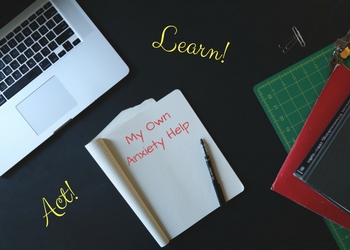What To Do When You Can't Find Help for Anxiety
Deciding to seek help for anxiety so you can take back your life but then being unable to find help for anxiety is incredibly frustrating (Types of Mental Health Doctors and How to Find One). For a variety of reasons, such as insurance problems, lack of qualified mental health professionals in an area, difficulty getting or keeping appointments, and more, mental health help isn’t always readily available. While ideally everyone would be able to receive medical and therapeutic help for anxiety, doing so isn’t necessary to treat and manage anxiety. There are things you can do when you can’t find help for anxiety.
Can’t Find Help for Anxiety? Try These Anxiety Treatments
 In the absence of doctors and mental health counselors, you can take charge of reducing anxiety (When Do You Need Anxiety Help?). Professional helpers often approach anxiety methodically, as a problem to be investigated and systematically eradicated. You can do the same.
In the absence of doctors and mental health counselors, you can take charge of reducing anxiety (When Do You Need Anxiety Help?). Professional helpers often approach anxiety methodically, as a problem to be investigated and systematically eradicated. You can do the same.
Think like a scientist. Anxiety has a nasty habit of taking over our entire being, top to bottom, inside and out. When anxiety is all-consuming, it feels impossible to deal with. So, like a scientist, step back and investigate it in chunks. Describe your physical and emotional symptoms. Keep track of how anxiety affects your thoughts, feelings, and behaviors. Knowing how anxiety is affecting you is an important first step in knowing what to do about it.
Investigating Anxiety
- Analyze your findings. Now that you know what anxiety does to you, consider the evidence objectively. Rate your symptoms from most- to least-bothersome. Work on those symptoms one (or a small few) at a time. Start with the worst and work your way down. This helps you keep on track when you can’t find help for anxiety.
- Take care of yourself. Think of what doctors advise. If we are ill, they treat the symptoms of the illness (just like you’re doing with anxiety), and they also check in to make sure our lifestyle is healthy. Nutrition, exercise, hydration, and stress management are very important in feeling well. These apply to anxiety as well. When you can’t find anxiety help, be your own adviser and develop healthy lifestyle habits. This will, over time, reduce anxiety (Treating Anxiety: Self-Care? Why Bother? Mental Health Recovery).
- Educate yourself. Of course, medical and mental health professionals like therapists are very important, but when you can’t get professional help for anxiety, take charge by learning all you can about anxiety and how others have dealt with it. Reading non-fiction, factual information like books and articles can equip you with the knowledge you need to get rid of anxiety. Memoirs allow you to directly read other people’s experiences and can give you anxiety management ideas. Fiction, and novels written about characters living with anxiety, can help you see what anxiety looks like, how it affects a life, and what can be done about it.
When You Can’t Find Anxiety Help, Reach Out in Other Ways
Sometimes it’s necessary to think outside the box. When we think of help for anxiety, we often think of doctors, psychologists, therapists, and other mental health professionals. There are other sources of anxiety help that can be excellent resources.
- Non-profit organizations: Groups like the National Alliance on Mental Illness (NAMI) have local affiliates across the US that offer groups, classes, and information about other community resources. Other countries and locations have similar organizations.
- Support groups: Some are associated with organizations like NAMI, while others are more informal. Regardless of how they’re formed, anxiety support groups made up of others who live with anxiety can offer great help for dealing with anxiety.
- Friends and family: Having even just one or two people in your life with whom you can talk and share your struggles with anxiety can go a long way toward healing. Feeling heard, troubleshooting problems, and brainstorming solutions can all reduce anxiety. Be sure to talk about other things, including things going on in the other person’s life, so the relationship is about more than anxiety.
Sometimes formal help for anxiety is unavailable. Don’t give up. Use resources within you and around you, and you’ll reduce anxiety even when you can’t find that professional help.
Let's connect. I blog here. Find me on Facebook, Twitter, LinkedIn, Instagram, and Pinterest. My self-help book and mental health novels, including one about severe anxiety, are here.
APA Reference
Peterson, T.
(2017, January 12). What To Do When You Can't Find Help for Anxiety, HealthyPlace. Retrieved
on 2025, November 9 from https://www.healthyplace.com/blogs/anxiety-schmanxiety/2017/01/what-to-do-when-you-cant-find-help-for-anxiety